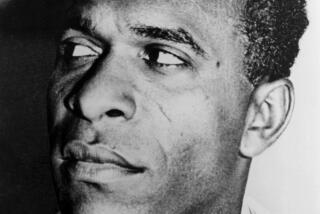‘Therapy’ Grapples With Ethical Problems of Globalism
- Share via
As pundits spout praise of laissez faire capitalism, and corporations close down factories in search of cheaper labor and fewer regulations, there are still some people who realize that globalism is not an answer or a panacea, but a problematic question. Ariel Dorfman’s provocative new novel, “Blake’s Therapy,” introduces us to Graham Blake, a corporate executive with a conscience, who has begun to suffer from sleeplessness and self-doubt.
Blake’s company, Clean Earth Inc., manufactures vitamins and herbal remedies and has branched out into eco-tourism. Clean Earth has made the cover of Time magazine as “The Company That Saved the Rain Forest,” while on Wall Street, its stocks have soared.
But all is not well. Faced with the threat of a hostile takeover by an unscrupulous competitor, Blake has reluctantly agreed to some downsizing but refuses to close his old Philadelphia factory to relocate somewhere cheaper. His ex-wife, who’s still his business partner, tells him he’s being foolishly sentimental: He needs to “grow up.” But it is not clear whether “growing up” entails abandoning his ethics or simply learning to make compromises that will keep a good company from being taken over by bad people.
Desperately uneasy, longing to recapture the lost joys of a clean conscience, Blake agrees to undergo a highly unorthodox, exceedingly expensive form of “therapy” at the hands of a mysterious Dr. Tolgate. The “therapy” involves locking Blake in a suite where he watches on video camera the daily comings and goings of a supposedly typical family of Latino workers in his Philadelphia factory.
Not only do the hidden cameras and microphones seem to invest Blake with an almost godlike omniscience but Dr. Tolgate also maintains a small army of helpers whose job is to put into effect any order that Blake might issue affecting the family’s fate. Blake becomes utterly enraptured with one member of the family: graceful, kind-hearted Roxanna, who works as a nurse at the factory. Before he knows it, he finds himself giving in to sexual jealousy and having her boyfriend put in jail.
But, although Blake experiences what he fears may be a “primal urge to harm people,” Dr. Tolgate urges him to dig deeper to discover the kind of man he really is. There are several twists and turns, and a considerable amount of suspense, as Blake (who is not without his doubts as to the kind of man Dr. Tolgate really is) pursues his quest for inner peace.
Blake’s story seems to invite at least two contradictory readings. On one hand, when put in control of other people’s lives, Blake discovers he really is a good man who does the right thing. Thanks to the “therapy,” he now trusts himself, unlike many good people who may be too self-critical and self-doubting to be effective.
On the other hand, Dr. Tolgate seems a rather sinister character. Might it also not be that in providing his wealthy clients with clean consciences, he is freeing them from what few moral restraints they have? The goal, as Tolgate explains, “is for the client to understand who he really is and act accordingly.”
Many of his clients, he tells Blake, have discovered that they were all too capable of doing evil. What, then, we may wonder, would it mean for a sadistic person to “understand who he really is and act accordingly”? Does “acting accordingly” mean that he will recognize the need to rein himself in or that he will embark on an orgy of wicked deeds in some crazy quest for “self-realization”?
Dorfman, an exiled supporter of the Chilean leader Salvador Allende and opponent of the notorious Pinochet regime, has tackled the themes of power, corruption, conscience and resistance in the novels “Widows,” “Mascara” and “Hard Rain,” and in the plays “Death and the Maiden” and “Speak Truth to Power.”
In “Blake’s Therapy,” Dorfman is perhaps addressing the situation so memorably encapsulated by Shelley in “Prometheus Unbound”:
Many are strong and rich, and would be just,
But live among their suffering fellow-men
As if none felt: they know not what they do.
But even if we believe that self-knowledge has freed one good man from crippling guilt, Dorfman’s closing note informs us that despite his own assiduous search for a Blake-like executive at a recent World Economic Forum at Davos, Switzerland, he found no one like him. Leaving us with more questions than answers, “Blake’s Therapy” should prompt us to take a closer look at the much-ballyhooed New World Order.
More to Read
Sign up for our Book Club newsletter
Get the latest news, events and more from the Los Angeles Times Book Club, and help us get L.A. reading and talking.
You may occasionally receive promotional content from the Los Angeles Times.










